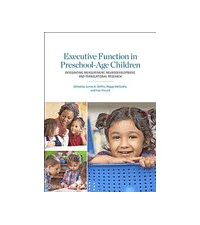“Executive Function in Preschool-Age Children: Integrating Measurement, Neurodevelopment, and Translational Research”

“Executive Function in Preschool-Age Children: Integrating Measurement, Neurodevelopment, and Translational Research.
Edited by James A. Griffin, Peggy McCardle, and Lisa S. Freund
American Psychological Association
Washington, D.C., 2016
Book offers perspectives on executive functioning
Reviewed by Kerry Morrison, Psy.D.
The concept of Executive Functioning (EF) or Executive Functions (EFs) plural first began appearing in the professional literature about 15-20 years ago.
Now knowledge of EF is commonplace and has changed how neuropsychologists, clinical and school psychologists and educators understand how children develop and organize their thinking and behavior.
As a clinician who works with many adolescents diagnosed with Attention Deficit Disorder, helping them understand EF and develop skills that will help them succeed in high school and college is a common treatment focus.
My working knowledge of EFs was that these processes were beginning to develop in adolescents, but were not fully developed until adulthood. Prior to reading this book, I was unaware that EFs can be observed, measured and intervened upon in very young, preschool-aged children.
According to this text, there are more than 100 definitions of EF. All acknowledge the importance of EF, but there is little consensus of the definition and components of it.
Executive functioning is a complex construct that is an umbrella term referring to a range of cognitive abilities involved in control and coordination of goal-directed actions.
The purpose of this edited volume is to reflect the current state of knowledge regarding EF measurement, neurodevelopment and translational research.
Executive Functions in young children entail multiple cognitive processes that, over time, support the child’s ability to increasingly regulate their own behavior.
The core cognitive processes involved include working memory, inhibitory control and cognitive flexibility.
Working memory is the ability to pay attention and remember facts while using them to complete tasks.
Inhibitory control involves the ability to follow rules, modulate emotions and delay gratification.
Cognitive flexibility is the ability to plan, make judgments and self-correct, according to the authors.
EF skills are adaptive, goal directed behaviors that enable the child to override more automatic (e.g. cry, scream, etc.) or impulsive (e.g. grab, throw, etc.) thoughts and responses.
EFS are fundamental to learning. Research of EF skills has repeatedly found them to be more important for school readiness than IQ or entry-level reading or math.
Authors throughout the volume note that there has been a focus on EF skill development and competence in preschool-aged children, as EF skills in early childhood are highly predictive of EF skills in later life.
Success in one’s career takes creativity, flexibility, self-control and discipline. Central to all of these components are EFs, which can be thought of as a family of skills, not just one skill. Neurodevelopment of EF skills depends on neural circuitry, namely in the prefrontal cortex, but EFs can be sensitive to socioeconomic and environmental factors as well.
Early intervention in development or improving environmental conditions through different approaches can successfully improve EF in early life. In turn, this is thought to be critical to improving happiness and success throughout the life span.
What this book highlights are the discrepancies in conceptualizing and defining EFs as well as the lack of standardized measurements and the need for a continuum of measures across development.
Another interesting concept raised is that the early assessment of EFs can indicate risk for future school failure, job failure and other psychosocial issues.
The chapter on imaging (brain scans) EFs in typically and atypically developed children was very striking and thought provoking. The take home message in this readable volume by leading researchers is that intervention with preschool-aged child can minimize risk and bolster resilience. This information has many implications for educators and clinicians alike.
Overall, this is a nice compilation of a range of information about executive functioning from general descriptions of what EFs are and how they develop to in-depth discussion of assessment, neurobiological mechanisms and functions, family risk and treatment development.
At times, some of the information was too detailed for my tired brain, but I knew that if I had this volume on my book shelf I could back to it later when I had more questions or wanted to understand an aspect of EFs in more detail.
Kerry Morrison, Psy.D. is a licensed psychologist in private practice in Greenfield, Mass., who also consults, teaches and provides trainings on mental health topics.
Learn more about the book: Executive Function in Preschool- Age Children: Integrating Measurement, Neurodevelopment, and Translational Research
